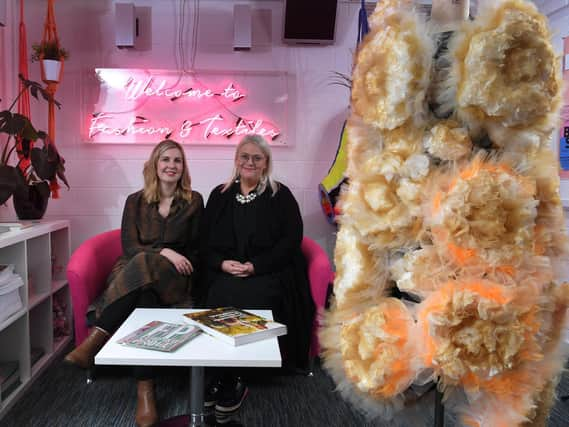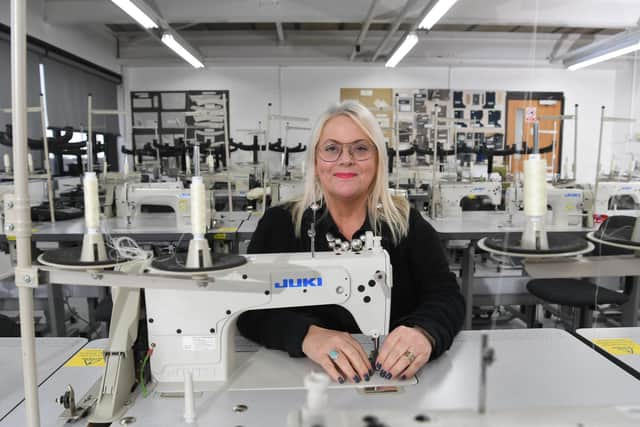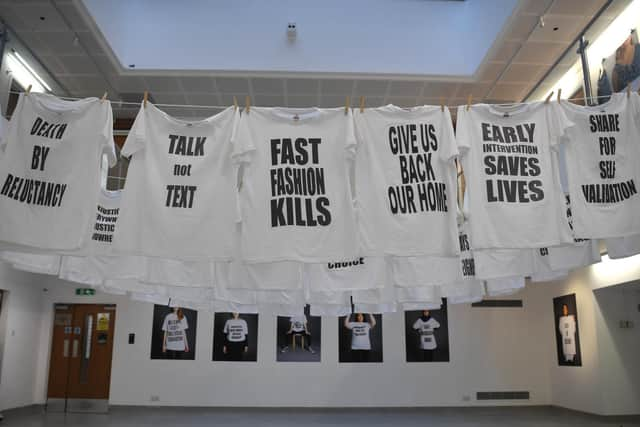This is why the future of fashion is in a plastic bag, say UCLan lecturers


A generation of students from the University of Central Lancashire are transforming waste products into high fashion.
The collections have been designed to encourage recycling and raise awareness of environmental issues.
Advertisement
Hide AdAdvertisement
Hide AdChristopher Molloy, a senior fashion lecturer, said: "Greta Thunberg is a school girl who has connected a generation to activism. She's spear-leading the youth and now schools go on strike.


"That's a new thing.
"We're getting these students coming in, doing our course and creating collections that look highly sophisticated and desirable."
Amanda Odlin, also a senior fashion lecturer, leads a zero-waste project where students up-cycle both unwanted items and scraps of fabric.
Her colleague Eve Astle, who specialises in fashion promotion, said: "Last year, at Graduate Fashion Week, we looked at how to use by-products in beautiful ways, without screaming bag lady."


Advertisement
Hide AdAdvertisement
Hide AdThe students have transformed waste products like plastic carrier bags, pizza packaging, shower sponges and old window blinds into couture garments over the years.
Allison Orr's collection made entirely from white plastic even caught the eye of Hilary Alexander OBE, the Daily Telegraph's former fashion director.
Her collection was one of 28 picked from thousands to star in the Best of Graduate Fashion Week catwalk show and Allison took part in the UK Government’s GREAT Britain Campaign video.
The UCLan graduate, who made both necklaces from straws and rosettes from carrier bags, was inspired by the planet's plastic-swamped oceans.


Advertisement
Hide AdAdvertisement
Hide AdStudents also have their eyes on eco credentials with another futuristic idea - clothes rental for holidaymakers.
UCLan students have come up with the "travel wardrobe," which would allow customers to pick up a collection of rented clothes at their holiday destination, creating bag-less travel.
It is something that has already begun to make waves in the industry, with Selfridges being one of the first luxury high street brands to feature a huge retail section dedicated to leasing clothes.
And Hurr Collective, an app allowing users to lend and borrow clothes from each other, launched its first ever physical pop-up shop in Selfridges last month.
Advertisement
Hide AdAdvertisement
Hide AdIt will run for six-months and feature a collection of 200 curated pieces available for customers to take home for between four and eight days at a time.
Stock will rotate on a weekly basis and include specially curated edits for London Fashion Week, featuring items from leading luxury brands like Gucci.
Amanda said: "Generation Z don't bother about owning stuff, as they are used to renting.
"But the market has its pitfalls, as it would need to have all sizes."
Advertisement
Hide AdAdvertisement
Hide AdThe lecturers also revealed other directions for the future of fashion, including repair businesses like The Restory in London, which restores luxury shoes, bags and leather goods.
Meanwhile, technology is helping creative designers to cut out the sewing production and use digital sampling to remove waste.
And Professor Rebecca Earley, of the University of the Arts London, has developed the Service Shirt, made from biodegradable, paper-based fabrics.
It has been designed to replace polyester - which most garments are made out of - and last for more than 50 years before being chemically regenerated.
Advertisement
Hide AdAdvertisement
Hide AdPolyester is a plastic made from crude oil, which sheds micro-fibres into the sea when clothes are washed and produced, and takes more than 200 years to decompose.
Some 77 million tonnes of it was created globally in 2016.
With news of plastic pollution hitting headlines and flooding social media, consumer attitudes are also changing, leading to Governmental policy change, like the ban on plastic straws, drinks stirrers and cotton buds.
It is partly driving the fashion industry's transformation, according to Christopher.
As he said: "Consumers push everything and they have more power year on year."